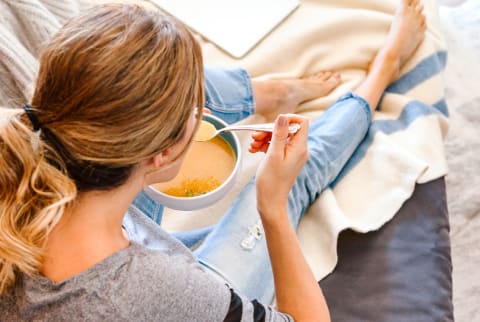Advertisement
How A Longevity RD Took Care Of Herself When She Had COVID-19


One Monday morning this past year, I woke up feeling too tired to get out of bed. While that's not uncommon for some, it's extremely out of the ordinary for me. I usually wake up feeling active and stick to a regular morning routine. That morning, things were different.
Initially, I blamed that exhaustion on my busy schedule from the week before and an overall lack of sleep. As the day went on, though, I started to develop a scratchy throat and a runny nose. Since my work is often client-facing, I decided to get a COVID-19 test to be safe. By the end of the day, I broke a fever of around 100 degrees.
Even before getting my test results back, I knew that something was off, and as a nutritionist, I knew that it was time to ramp up the immune-supporting nutrients in my diet.
The immune-supporting nutrients I added to my diet.
The first thing I decided to make was an antioxidant-rich beverage filled with cranberries, red currants, cherries, raspberries, lemon, and honey. I mixed those ingredients in the food processor, then added the concoction to hot water. Not only is the drink delicious, but it's also a simple way to increase your intake of immune-supporting vitamin C.
For the first few days, I didn't have much of an appetite (though I did retain my sense of taste and smell), so I opted for nutrient-rich and soothing drinks instead of solid food.
Along with the berry beverage, I also drank hot ginger tea with lemon, turmeric, and honey. Turmeric and ginger are high in anti-inflammatory properties, while hot water with honey also has a range of soothing health benefits.
For protein and gut support, I drank bone broth—and when my appetite allowed for it, I'd use the broth as a base for vegetable soup containing blended leeks, broccoli, onions, herbs, and spices.
After the first three days, I continued drinking tea and incorporating berries and other antioxidant-rich foods into my diet. I also started transitioning back to my traditional everyday diet of nutrient-dense meals, with protein like chicken and fish.
How I supported my immune system, aside from diet.
While nutrition plays a major role in metabolic, gut, and overall health, there are plenty of other factors that support the body.
To avoid exposing others, I stayed home alone for three weeks. While being sick can be a physical burden, the social isolation can take a mental toll, too. I was well aware that elevated cortisol (stress) levels could weaken my immune system1. To keep my cortisol levels balanced and to help me unwind before bed, I practiced loving-kindness meditations and took hot Epsom salt baths.
I also followed a supplement routine consisting of magnesium for enhanced sleep, a probiotic for gut and immune support, vitamin C, and omega-3s.
By day four, I started regaining energy and strength, so I slowly but surely began incorporating yoga stretches, breathwork, and strength exercises (like pushups, squats, and sit-ups) back into my routine.
Bottom line.
As much as we would like to be, we aren't in control of whether or not we contract a virus. We can, however, be in control of how we nurture our bodies before, during, and after a positive diagnosis. Of course, every body is different and may react differently to a virus such as COVID-19. However, in my experience, feeling empowered to eat nutritious foods, move my body (after getting plenty of rest), and reach out to loved ones via video chat or phone call helped me stay mentally and physically well while I was recovering from COVID-19. This is not the time to be hard on yourself, but it is the time to support yourself in the most loving, gentle way.